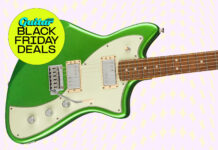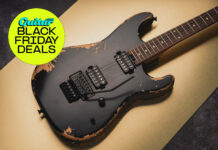
“Some people collect baseball cards, some people collect cars or art… for me, guitars are that”: Kiefer Sutherland
The Groucho Club in London’s Soho seems a fitting venue for an encounter with a genuine Hollywood star. Yet once we wind our way upstairs to the room in which our interview takes place – complete with its own bar, fireplace and a striped wall painted by Turner Prize nominee Ian Davenport – Kiefer Sutherland’s unaffected demeanour almost makes us forget for a moment that the unmistakable weatherworn voice we’re listening to is familiar to millions.
With long player number two in the can, Sutherland is in Europe to play a short acoustic tour. Billed as ‘Kiefer Sutherland Up Close’, the intimate dates include audience Q&A sessions, while the award-winning Canadian actor and singer-songwriter also takes the opportunity to tell some of the stories behind his songs. Indeed, if there’s a common thread running through his work in film and television and the country-fried rock that’s also close to his heart, it’s storytelling:
“I think for the longest time I’ve tried to find the common denominator of what I love about acting and what I love about music, and at the root of it is the storytelling. Getting together with a group of actors and a director and a cinematographer to tell a story, or getting together with a group of musicians to tell a story. The big difference is that the songs are really personal and from my life. And I think that it took me a minute to adjust to the fact that there was no character in between me and an audience – there was just me.”
Does that make it more nerve-wracking, or make you feel more exposed?
“Oh man, my hand was shaking so badly! As an actor, if you’re nervous, you just put your hands in your pockets. As a guitar player that doesn’t work so well! Every step of it has been a kind of challenge to overcome… whatever fears one person has, they’ve all had to be confronted on some level during this process. We’ve played 300 shows in the last two-and-a-half years, it was kind of a ‘sink or swim’ thing, but it’s been one of the most rewarding experiences I’ve ever had in my life.”
Winding the clock back a little, how did your love affair with the guitar begin?
“I played violin from the time I was four. I wanted a guitar desperately when I was seven and my mum said: ‘If you play violin until you are 10, I’ll get you a guitar.’ And I played the violin until my 10th birthday and she kept her word and got me a guitar and then I never picked the violin up again!
“And then I just took [the guitar] with me everywhere. It was a terrible Yamaha acoustic, it was a piece of crap and the fucking action was so high, but by the time I could start playing barre chords, my hands were quite strong ’cause of that guitar. I remember I used to pawn Christmas gifts, and I would take whatever money I had made and I would get to the guitar store and I would put a downpayment on very funny guitars.
“I saw one last year that I hadn’t seen in forever, a Gibson Sonex. It was such a cheap kind of version of a Les Paul. I just remember that, as a kid, I was always trying to get a guitar, or work my way up to getting a good one. I can’t remember a time really where I wasn’t either chasing a guitar or playing.”
Was collecting guitars simply a natural progression from there?
“At first, it was very practical. You wanted a Strat, you wanted a Tele and you wanted a Les Paul. The big mistake I made was, we had a studio and I got the kind of cases where you would have all the guitars out, and you’d go, ‘Well, there’s two slots missing there. I know exactly what I’d like to fill that with.’ And before you knew it, you had 80 to 100 guitars.
“Some people collect baseball cards, some people collect cars or art… for me, guitars are that. They are beautiful works of art. And what I found so interesting was that every guitar makes you play differently. For whatever reason, you pick up that guitar and there’s a specific goal that you want from your playing. But then I got to the point that I had so many guitars I wasn’t able to play them all. And that’s when I went, ‘Well, this is ridiculous, they all need to be played’.
“I had real vintage guitars but they were all bought for playability. I never had a guitar that was a collectible guitar but didn’t play really well. And so at some point I just went, ‘Well if you can’t play them, then they need to go to someone else who will.’ And so I brought the collection down to really about 20 guitars. And I use all of them.”
What are some of your favourites?
“I have two 1954 Les Paul Juniors, one a TV Yellow and one a sunburst. I have three guitars that I go out on the road with, a Gibson Dove, a Gibson Hummingbird and in the UK or in Europe I have a Fano, with a Seymour Duncan Hot Rails in the back, and then in the States I have a Tele with a Hot Rails in the back and that’s really the only pickup I use.
“There’s one that I haven’t played a lot, which is a 1967 Firebird. And the fact that it’s original and that it didn’t break its neck… you know, it’s such a rare thing. I don’t pull that out a lot. But the guitar that I use the most is the Tele, electric-wise. Just ’cause if I do need that front humbucker, it’s quite versatile. But live, I just tend to use the Seymour Duncan back pickup.”
Who were the guitar players you admired when you were growing up?
“I was a big fan of Peter Frampton. I thought he was an incredible guitar player. And then obviously Jimmy Page was a huge, huge influence. I liked the melodic quality, even though Led Zeppelin was a very hard rock band, there was a melodic quality to Jimmy Page’s guitar playing that I thought was incredible, and the same with Pink Floyd. I can sing the solos from Pink Floyd as well as I can sing the lyric of any of their songs. I enjoyed that more than the Eddie Van Halen kind of stuff. I was not as attracted to that as I was David Gilmour or Jimmy Page.
“And then Jeff Beck’s earlier stuff with Rod Stewart when he was a blues player, as opposed to the incredible place that he’s gone to, but I just really liked the simplicity when he was playing the blues. Eric Clapton is another one. Duane Allman is another one. And then I would have to say my favourite guitar player is Prince. Again, his craftsmanship with his guitar, melody – I just think he was an extraordinary player.”
Where did the country-rock influence in your own material come into the mix?
“Well, it’s a combination of things. Bob Seger. Jackson Browne. Those kinds of writers. Lynyrd Skynyrd. They were huge influences for me, just as a listener, but then what I loved about country music was that, as a writer, they sing stories. A Boy Named Sue is a perfect example. That has a beginning, a middle and an end. And so, I enjoyed that a great deal, and so, singer-songwriters like Bob Seger or Jackson Browne, Bob Dylan, they did that too – Johnny Cash, Merle Haggard, Waylon Jennings. All of those artists, they told stories, and so I just naturally gravitated towards that because that’s the way I like to write.
“What I end up doing versus the range of things that I listen to is very different. But as a writer, it again goes back to the storytelling and I like to have a beginning, a middle and an end to something that’s quite direct. Pink Floyd’s another great example where so much of their music is metaphorical. Mine is not. Mine is pretty straightforward.”
How did the sessions for Reckless & Me come together?
“It was actually really cool. I was doing a television show called Designated Survivor, and so we had very limited time, so I would fly into Los Angeles. We recorded at Capitol Records, which was really cool, in Studio A. There’s a picture of me standing in front of a picture of Paul McCartney standing in front of Frank Sinatra! So you couldn’t not be aware of the significance of where you were.
“Jude [Cole, Sutherland’s producer and co-writer] put together an incredible group of players – Waddy Wachtel on guitar, Jim Cox on piano, Brian MacLeod on drums. Jude and I would go back and forth on guitar, Jude played some bass and we had a couple other guys come in, but we would do five tracks in two days. So we did half the record in one go and then Jude would take the stuff back to his studio and kind of put on a little accordion piece or mandolin piece and kind of fill it out from there. And then about seven weeks later, I came back and did the other five in two days and even though it was stretched out, we kind of recorded the record in really a few weeks.”
Are you expecting the songs to develop and evolve on the road?
“Not really. We try to play the record, because that’s why we made it. We’re not a jam band. I always loved that line from Tom Petty, ‘Don’t bore us, get to the chorus!’. I went and saw a Ramones show when I was in my early 20s and I loved the fact that none of the songs were more than two-and-a-half minutes. It just kept driving that show. The interesting thing about the second record is that the entire record was centred around what I wanted for a setlist. I kept thinking, ‘If we had an uptempo song here, or that kind of a ballad, this would make the set really good.’ So it was really interesting writing the second record with purpose. It was really, ‘How do we make the show better?’. I think that worked out for us.”
Which songwriters would you like to work with in the future and what would be a dream collaboration for you?
“Chris Stapleton is an incredible writer. Whiskey And You is still one of the saddest, most heartfelt songs I’ve heard in the last 10 years. And I just think he’s a wonderful writer. Colter Wall, who wrote Sleeping On The Blacktop, I think that’s an incredible song. One of my favourite writers of all time would be Paul Simon and I would give a left foot to just be able to sit with him and even ask him about his process.
“The nice thing about playing and writing is that there’s no endgame. There’s no finish line. There’s no, ‘I finally did it’. It’s just a process that you’ll have with you for the rest of your life. And if you accept that, then that’s a really precious gift. The same thing goes for at least my experience with acting – there’s no moment that you cross the finish line and go, ‘Oh, I’m great’.
“It’s always a process of trying to get better and figure something out. Having said that, I can read a script and go on a set and after 35 years, I have a very, very strong idea of what I’m going to do with it. My experience with music, at least at this present moment, is that there’s so much that I’m still learning that it makes you feel almost young, because the learning curve is so great. And you can write a song, but there’s a thousand different ways to play it. That’s kind of awesome, to know that it’s that pliable.”
Did the veteran musicians you worked with on Reckless & Me dispense any pearls of wisdom?
“No one’s ever really given me advice. Really, the only advice that I would give or accept is the same kind of advice that I would have with regards to acting. And the only person who ever gave me advice with that was my dad. He said: ‘Don’t ever let ’em catch you lying, ’cause if they do, they’ll never forgive you for it.’ And he was right, and what he meant was, that if there’s a moment in a script and it says, ‘and the character cries’, if you don’t feel that, play something different. Because if you fake the crying, you’ll get caught.
“And it’s the same with music – if what you’re singing is something that’s authentic, and something that you actually feel, then people will understand that. If you try and become manipulative with it, they’ll understand that, too. So I think, more than anything: play, write, sing something that matters to you.”
Are there songs by other artists that you enjoy playing because they resonate with you in a similar way?
“Yeah, Bob Dylan Knockin’ On Heaven’s Door I’ve played forever. And I tell a story about my dad and my sister. When my mum and dad got divorced, my mum had to go back to Canada to find a place for us to live, and so for about six months, we were left alone with our dad. And my mum, she was kind of the strict one, and my dad had kind of no rules or regulations and so it was a really kind of wonderful time. And he played this Bob Dylan best-of on 8-track, and I just remember all those songs, being driven to school when I was kid, and so I’ll play that.”
Finally, with such a heavy touring schedule ahead, is there a danger that you might get sick of life on the road with the other guys in the band?
“Trust me, if the last 300 shows didn’t kill us, the next 300 aren’t going to do us any damage…”
Kiefer Sutherland and his band return to the UK in July. Visit kiefersutherland.net for tickets.
The post “Some people collect baseball cards, some people collect cars or art… for me, guitars are that”: Kiefer Sutherland appeared first on Guitar.com | All Things Guitar.
Source: www.guitar-bass.net













